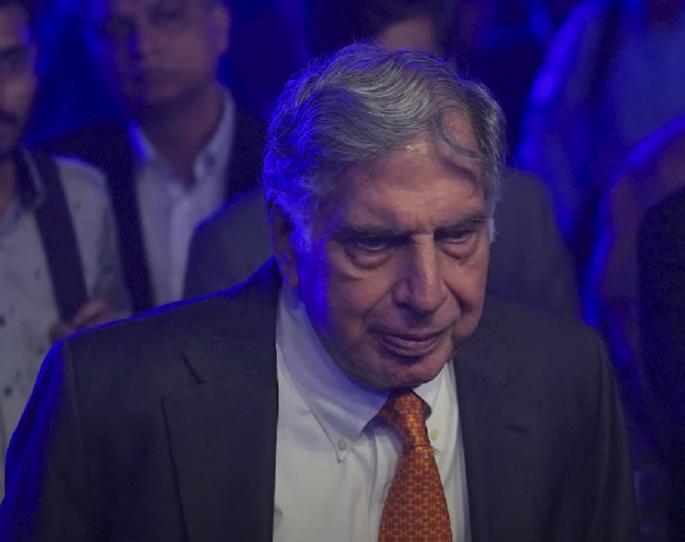At the age of 86, Ratan Tata passes away
On Wednesday, the 86-year-old renowned industrialist and former chairman of Tata Sons, Ratan Tata, died away. He passed away in a Mumbai hospital following a protracted illness.
Even though Ratan Tata was relatively impoverished by the standards of India’s wealthiest billionaires, he was without a doubt the most admired businessman in the country. He was, nevertheless, more influential than any other Indian businessman due to his role as head of the Sir Dorab Tata Trust and the Sir Ratan Tata Trust, which jointly own 66% of Tata Sons, the parent company of the biggest and most prominent business house in India.
Though he was very frequently in the public eye, the reticent Parsi bachelor businessman was a real lone star and difficult to understand. In an unguarded moment, his former executive assistant R Venkataraman responded to a question about his connection to his former employer by saying that the individuals closest to Ratan were not people, but rather his pet dogs, who were all strays. Tata admitted in an interview that “I am not very sociable but I am not anti-social,” however she did not completely dispute this portrayal.
Ratan’s upbringing, which was marked by strictness, loneliness, and a sense of rejection, had an impact on his character. Naval, his father, was a strict disciplinarian. Ratan said to me, “He expected a certain decorum, but it wasn’t like my brother Jimmy and I got caned.” We were not permitted to show off how wealthy we were.
When Ratan was younger, his primary supporter was his grandmother, Lady Navajbai Tata, who was the widow of Sir Jamsetji Tata’s younger son. Ratan’s father then remarried and had a second family, while his mother Sooni departed when he was just ten years old. Navajbai instilled in her grandson the exceptional industrial and charitable heritage of the Tata group, specifically the remarkable tale of the visionary founder Sir Jamsetji who, among many other groundbreaking endeavors, envisioned the establishment of India’s first steel mill, first hydroelectric plant, and Indian Institute of Science in Bengaluru.
Ratan’s grandmother made it apparent to him at a young age that he had big shoes to fill. Few people are aware that Ratan and his father Naval were not genuinely derived from the founder of Tata. Following Ratanji’s death in 1918, his widow Navajbai adopted Naval, an orphan boy from the J N Petit Parsi Orphanage in Parel, Mumbai. Neither of Jamseji’s two sons had children.
After Ratan received his architectural and engineering degrees from Cornell University, it was Navajbai who insisted that he return to India. The senior members in the company at the time, including the chairperson and distant relative JRD Tata, did not see Ratan as the heir apparent to the empire, despite the fact that his grandmother had complete trust in him.
The group’s founder, Jamsetji, was from a deeply religious Parsi priestly family in Navsari, Gujarat, and he established the standard for the family’s extraordinary generosity at the beginning of the 20th century. The Tata Memorial Cancer Hospital, the Tata Institute of Fundamental Research, and the National Centre for Performing Arts are among the organizations supported by the Tata trusts in addition to the Indian Institute of Science. Additionally, Jamsetji established the standard for the group’s moral corporate conduct. The Parsis, a small minority group that takes great pleasure in their integrity in commercial dealings, ruled the group for several decades.
JRD made it very evident in the 1960s licensing permit raj era that the Tata group would not pay politicians under the table, even if it meant that their enterprises could not grow to their full potential. The Tata group briefly lost its top spot to the Birla businesses, but it quickly made a comeback thanks to adjustments in governmental regulations. The Zoroastrian maxim “Good Thoughts, Good Words, and Good Deeds” is engraved on Bombay House, the organization’s headquarters, serving as a reminder to all staff members.
Ratan was the perfect example of this Tata custom in both his personal and professional life. Compared to the new billionaires in India, he had a humble lifestyle. There wasn’t much security around his house. Ratan received accolades for his business achievements, including “India’s best brand ambassador” and “A model of corporate responsibility.” Among the biggest charitable organizations in the world are the two main Tata trusts.
Though there were sporadic hints of scandal—like the release of the Niira Radia recordings or the discovery of intercepted phone conversations indicating Tata executives were working with ULFA terrorists to protect their Assamese tea estates—nothing really damaged Ratan’s impeccable reputation.
The one incident that could have momentarily damaged Ratan’s reputation was his 2016 dismissal of the organization’s late chairman, Cyrus Mistry. The Parsi community and the business world were taken aback by the well-planned moves. This was especially true when Mistry accused Ratan of breaking regulations pertaining to insider knowledge, giving cronies favorable deals, and lacking openness in corporate governance in his response letter to the National Company Law Tribunal.
But in 2021, Ratan was validated when the Supreme Court agreed with him on every point the Mistrys brought up about the group’s leadership. Ratan also had the final laugh when his business skills was questioned by doubters. The group has benefited from his decision to replace Mistry with Natarajan Chandrasekaran.

It’s really a great and useful piece of info.
I’m satisfied that you just shared this helpful information with us.
Please stay uus iinformed like this. Thanks for sharing. https://Ternopil.pp.ua/
It’s really a great and useful piece of info.
I’m satisfied that you jusst shared this helpful information with us.
Please stay us informed like this. Thanks for sharing. https://Ternopil.pp.ua/